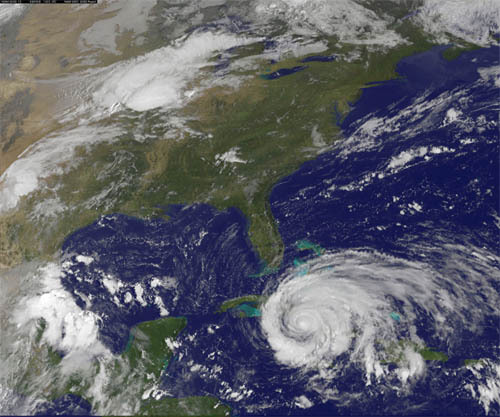The Atlantic hurricane season is heating up. Is it just another season or part of a worsening trend caused by global warming? A new study adds a twist to the scientific debate.
 The debate began in earnest in 2005 -- the year hurricanes and their destruction became indelibly engraved in the American psyche. It was the worst hurricane season ever. It had the most named tropical storms (27), the most hurricanes (15), and the most intense hurricane ever recorded (Wilma, a Category 5 that ravaged Mexico's Yucatan peninsula). The hurricanes that hit the United States, including Katrina, caused an estimated $100 billion in damages.
The debate began in earnest in 2005 -- the year hurricanes and their destruction became indelibly engraved in the American psyche. It was the worst hurricane season ever. It had the most named tropical storms (27), the most hurricanes (15), and the most intense hurricane ever recorded (Wilma, a Category 5 that ravaged Mexico's Yucatan peninsula). The hurricanes that hit the United States, including Katrina, caused an estimated $100 billion in damages.
Coincidentally, that same season two controversial papers appeared in the scientific literature. One by Kerry Emanuel at the Massachusetts Institute of Technology (summary | full report [pdf]) and the other by Peter Webster, Judith Curry and colleagues at Georgia Tech (summary | full report). Analyzing historical hurricane data, both concluded that the intensity or destructive potential of hurricanes had risen since the 1970s and that increase was strongly correlated with increases in sea surface temperatures and in turn to global warming.
Warm Water Fuels a Hurricane's Strength
The results were not totally unexpected. Hurricanes and typhoons, known commonly as tropical cyclones, are driven by the intake of warm air near the ocean surface (see this NASA video for more info). So, as oceans heat up, one would expect storm intensity to increase. But the magnitude of the increase in strength was much larger than our theories and models had predicted.
Some scientists challenged the MIT and GT results (see here [pdf] and here [pdf]). They argued that the historical data were not accurate enough to infer a long-term trend. You see, the methods used to observe hurricanes have changed over time (initially airplanes tracked hurricanes; now both airplanes and satellites track them); the way we analyze data has also changed. Some evidence in the 1970s and 1980s shows a tendency to underestimate storm intensity relative to the 1990s and 2000s, and as a result, some argued, the upward trend in hurricane strength inferred from the data was an artifact.
New Study in Nature Strengthens Global Warming Link
The debate over hurricanes and global warming has raged in the scientific community ever since. Now researchers from Florida State University and the University of Wisconsin-Madison -- James Elsner and colleagues -- have added what I think will prove to be a very significant contribution to the debate. Their contribution falls on the side of the MIT and GT studies.
To avoid the issue of data inconsistency, Elsner at al. limited their study to satellite observations since the 1980s. Moreover, they only used data that had been reanalyzed in a uniform, consistent manner.
The researchers found no increase in the total number of storms worldwide -- this is consistent with the MIT and GT studies. And using the maximum wind speed over the lifetime of a storm as a metric for intensity, they found only a slight increase (with a good deal of statistical uncertainty) in the average intensity of storms worldwide. But they also found that:
➢ the average intensity of the strongest storms has increased significantly since 1980 and
➢ the increase in the strength of these strongest storms is strongly correlated with the observed increases in sea surface temperatures, presumably as a result of global warming.
On average from 1981 to 2006, the wind speeds for the strongest tropical cyclones increased from 140 to 156 miles per hour, while sea surface temperatures increased from 28.2 to 28.5 degrees Celsius.
The largest increases in storm strength were found in the North Atlantic and Indian Oceans. Little or no intensity increases were seen in the Pacific Ocean. Elsner et al. speculate that the strong response in the two oceans and weak response in the one are caused by the differences in the average temperatures of these ocean basins. Since the Atlantic and Indian Oceans are cool relative to the Pacific, storms from these basins may be more sensitive to temperature increases.
Further Study Still Needed
Now, do be careful; this paper does not end the debate. I find these results, like those from the the MIT and GT papers, very compelling. But we have yet to reach a scientific consensus.
Moreover, even if hurricane strength is increasing, it doesn't mean we can blame global warming for the storms that have either battered our coasts or are barreling towards us. It is impossible to attribute a single storm or even a season to global warming. Also, it doesn't mean every year will see increasingly more severe hurricane seasons. Indeed, 2006 and 2007 were meek in comparison to 2005.
Many factors in addition to ocean temperatures affect hurricane intensity. And like all climate trends, the trend in hurricane strength from global warming can only be seen on decadal and longer time scales. But if correct, the study portrays a pretty frightening future with increasingly severe and destructive storms in a warming world.
Dr. Bill Chameides is a member of the National Academy of Sciences and the dean of Duke University's Nicholas School of the Environment. He blogs regularly at www.thegreengrok.com.